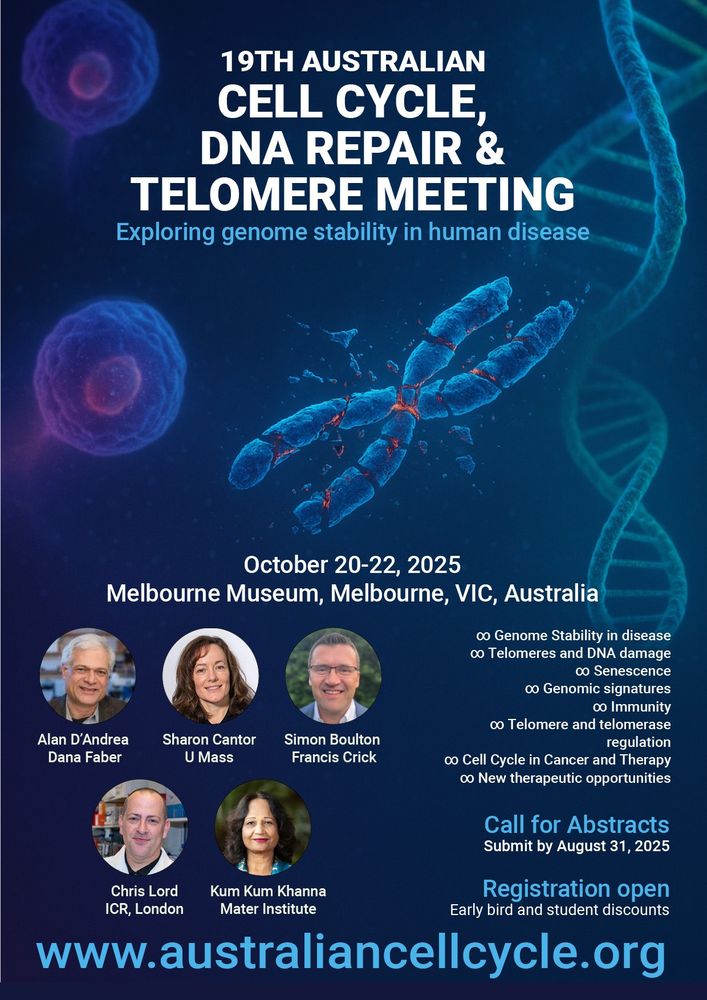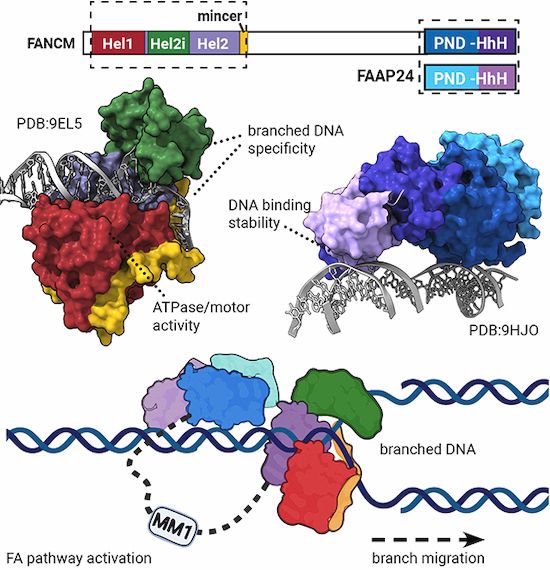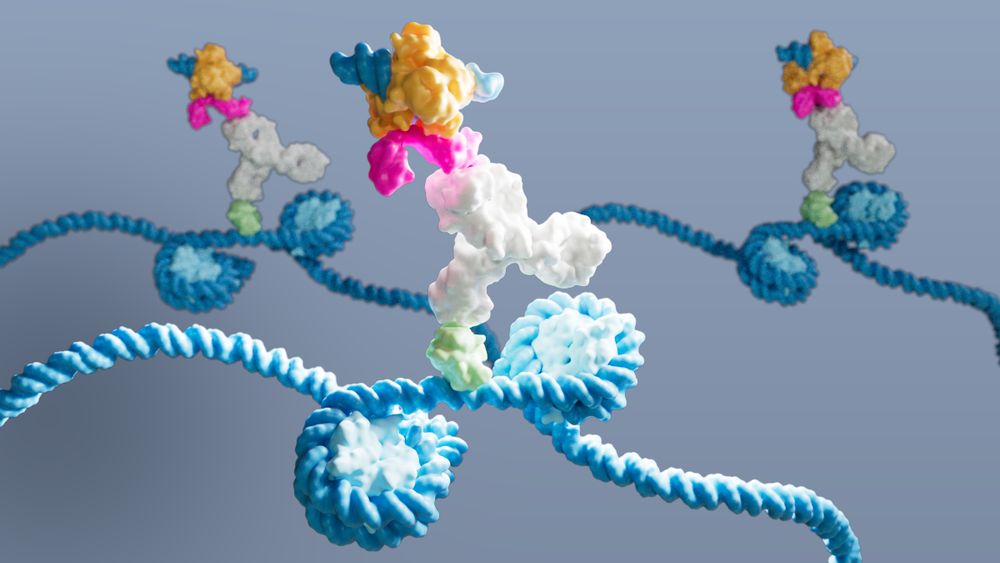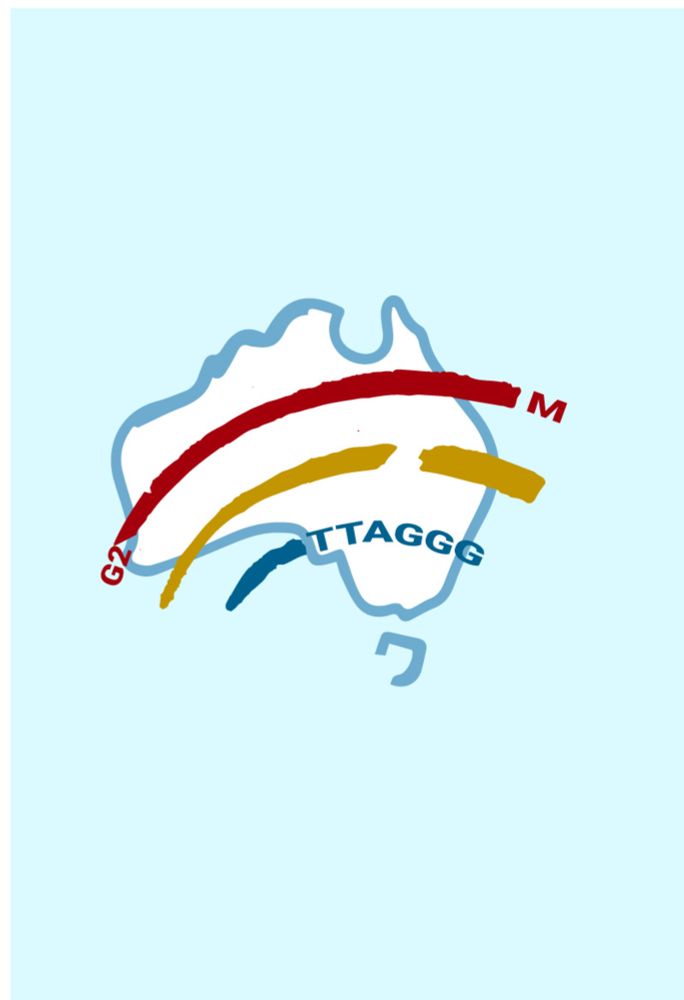Andrew Deans
@genomestability.bsky.social
Head of Genome Stability Unit at SVI, Melbourne. All things DNA damage response: Fanconi Anaemia, Bloom Syndrome, Gene editing, R-loops, telomeres, HR & more
Pinned

🧬 New from crystal structures from our lab in EMBO Journal! We reveal how the FANCM enzyme, an emerging therapeutic target it cancer, has evolved to specifically recognise branched DNA and activate the Fanconi anaemia pathway of DNA repair. doi.org/10.1038/s443... 🧵👇
🧬 List of 2026 DNA repair and genome stability conferences, now updated. Please let me know if there is anything missing!
docs.google.com/spreadsheets...
docs.google.com/spreadsheets...

DNA REPAIR/GENOME STABILITY CONFERENCES
docs.google.com
November 9, 2025 at 10:33 PM
🧬 List of 2026 DNA repair and genome stability conferences, now updated. Please let me know if there is anything missing!
docs.google.com/spreadsheets...
docs.google.com/spreadsheets...
Reposted by Andrew Deans
🧵 Our latest preprint is available.
It describes an extraordinary case of a boy with two very rare genetic conditions: Fanconi anaemia (FANCB, with a deep intronic pathogenic variant) and embryonic triploid–diploid mosaicism.
Read more here 👉 www.medrxiv.org/content/10.1...
It describes an extraordinary case of a boy with two very rare genetic conditions: Fanconi anaemia (FANCB, with a deep intronic pathogenic variant) and embryonic triploid–diploid mosaicism.
Read more here 👉 www.medrxiv.org/content/10.1...

Multi-lineage natural gene therapy mediated by embryonic triploid mosaicism in the context of Fanconi anaemia
Fanconi anemia is a rare inherited bone marrow failure syndrome caused by inactivation of genes in the Fanconi anemia/BRCA DNA repair pathway. We report a patient with X-linked Fanconi anemia, and aty...
www.medrxiv.org
November 7, 2025 at 1:54 AM
🧵 Our latest preprint is available.
It describes an extraordinary case of a boy with two very rare genetic conditions: Fanconi anaemia (FANCB, with a deep intronic pathogenic variant) and embryonic triploid–diploid mosaicism.
Read more here 👉 www.medrxiv.org/content/10.1...
It describes an extraordinary case of a boy with two very rare genetic conditions: Fanconi anaemia (FANCB, with a deep intronic pathogenic variant) and embryonic triploid–diploid mosaicism.
Read more here 👉 www.medrxiv.org/content/10.1...
Reposted by Andrew Deans
Our paper in Science is out! @souravagrawal.bsky.social, @rlynn.bsky.social, @susvirkar.bsky.social, and the rest of the team show human RPA is a telomerase processivity factor essential for telomere maintenance. This reshapes our thinking about telomerase regulation. www.science.org/doi/10.1126/...

Human RPA is an essential telomerase processivity factor for maintaining telomeres
Telomerase counteracts telomere shortening by repeatedly adding DNA repeats to chromosome ends. We identified the replication protein A (RPA) heterotrimer as a telomerase processivity factor critical ...
www.science.org
October 30, 2025 at 10:07 PM
Our paper in Science is out! @souravagrawal.bsky.social, @rlynn.bsky.social, @susvirkar.bsky.social, and the rest of the team show human RPA is a telomerase processivity factor essential for telomere maintenance. This reshapes our thinking about telomerase regulation. www.science.org/doi/10.1126/...
Reposted by Andrew Deans
Want to know how homologous recombination defects are caused upon loss of BRCA2? Check out our recent efforts in uncovering this phenomenon just out in Science!
www.science.org/doi/10.1126/...
www.science.org/doi/10.1126/...

FIGNL1 inhibits homologous recombination in BRCA2 deficient cells by dissociating RAD51 filaments
Homologous recombination (HR) deficiency upon Breast Cancer Gene 2 (BRCA2) loss arises from defects in the formation of RAD51 nucleoprotein filaments. We demonstrate that loss of the anti-recombinase ...
www.science.org
October 30, 2025 at 9:52 PM
Want to know how homologous recombination defects are caused upon loss of BRCA2? Check out our recent efforts in uncovering this phenomenon just out in Science!
www.science.org/doi/10.1126/...
www.science.org/doi/10.1126/...
Reposted by Andrew Deans
I attended the Australian Cell Cycle, DNA Repair and Telomere Meeting for the first time, and now I wish I could have attended it earlier.
Thanks much to the organisers and especially to @genomestability.bsky.social for putting such a nice meeting together.
I am looking forward to the future ones!
Thanks much to the organisers and especially to @genomestability.bsky.social for putting such a nice meeting together.
I am looking forward to the future ones!

October 27, 2025 at 1:27 AM
I attended the Australian Cell Cycle, DNA Repair and Telomere Meeting for the first time, and now I wish I could have attended it earlier.
Thanks much to the organisers and especially to @genomestability.bsky.social for putting such a nice meeting together.
I am looking forward to the future ones!
Thanks much to the organisers and especially to @genomestability.bsky.social for putting such a nice meeting together.
I am looking forward to the future ones!
It was a great honour to present the AGCT (Australian Genome instability, Cell cycle and Telomere) award to Prof Kum Kum Khanna yesterday evening at #ADCTM25. Kum Kum has had an amazing career in discoveries relating to these fields in Australia, and been a remarkable leader and mentor to many.

October 22, 2025 at 4:38 AM
It was a great honour to present the AGCT (Australian Genome instability, Cell cycle and Telomere) award to Prof Kum Kum Khanna yesterday evening at #ADCTM25. Kum Kum has had an amazing career in discoveries relating to these fields in Australia, and been a remarkable leader and mentor to many.
Ever wondered what S-phase tastes like? 3 lucky presenter prize winners will find out (+Amazon voucher!) at #ACDTM25. You can still register for this fantastic Melbourne meeting Oct 20-22. Official 10 year old taste tester: "lemon excision repair" is the best flavour www.australiancellcycle.org

October 13, 2025 at 2:25 AM
Ever wondered what S-phase tastes like? 3 lucky presenter prize winners will find out (+Amazon voucher!) at #ACDTM25. You can still register for this fantastic Melbourne meeting Oct 20-22. Official 10 year old taste tester: "lemon excision repair" is the best flavour www.australiancellcycle.org
The final programme for the Australian Cell Cycle, DNA repair and Telomere meeting is now available online: australiancellcycle.org/final-2025-p...
Its not too late to register for the October 20-22 meeting.
Its not too late to register for the October 20-22 meeting.

Final 2025 programme
The final programme for our conference is now available. You can download either just the programme, or the full abstract book by clicking below. A printed copy will also be provided to all registr…
australiancellcycle.org
October 9, 2025 at 11:18 PM
The final programme for the Australian Cell Cycle, DNA repair and Telomere meeting is now available online: australiancellcycle.org/final-2025-p...
Its not too late to register for the October 20-22 meeting.
Its not too late to register for the October 20-22 meeting.
Reposted by Andrew Deans
Today I am so pleased to present our work on how chromatin remodelers affect mesoscale chromatin organization.
www.science.org/doi/10.1126/...
www.science.org/doi/10.1126/...

ATP-dependent remodeling of chromatin condensates reveals distinct mesoscale outcomes
Adenosine triphosphate (ATP)–dependent chromatin remodeling enzymes mobilize nucleosomes, but how such mobilization affects chromatin condensation is unclear. We investigate effects of two major remod...
www.science.org
October 2, 2025 at 10:55 PM
Today I am so pleased to present our work on how chromatin remodelers affect mesoscale chromatin organization.
www.science.org/doi/10.1126/...
www.science.org/doi/10.1126/...
Australian Cell Cycle, DNA repair and Telomere meeting draft schedule is now online!
Join us with 5 plenary speakers, 16 invited national speakers, 22 selected speakers, 61 poster presenters and lots and lots of fun science. Less than one month to go.
australiancellcycle.org/draft-schedu...
Join us with 5 plenary speakers, 16 invited national speakers, 22 selected speakers, 61 poster presenters and lots and lots of fun science. Less than one month to go.
australiancellcycle.org/draft-schedu...
September 25, 2025 at 1:47 AM
Australian Cell Cycle, DNA repair and Telomere meeting draft schedule is now online!
Join us with 5 plenary speakers, 16 invited national speakers, 22 selected speakers, 61 poster presenters and lots and lots of fun science. Less than one month to go.
australiancellcycle.org/draft-schedu...
Join us with 5 plenary speakers, 16 invited national speakers, 22 selected speakers, 61 poster presenters and lots and lots of fun science. Less than one month to go.
australiancellcycle.org/draft-schedu...
Reposted by Andrew Deans
Happy to share the latest paper from the lab looking at PARP inhibitor responses in isogenic BRCA1 cell line pairs, from the Master work of Shiella Amelia Soetomo and Michael Sharp: dx.plos.org/10.1371/jour...

Differential PARP inhibitor responses in BRCA1-deficient and resistant cells in competitive co-culture
Synthetic lethality describes a genetic relationship where the loss of two genes results in cell death, but the loss of one of those genes does not. Drugs used for precision oncology can exploit synth...
dx.plos.org
September 22, 2025 at 11:23 PM
Happy to share the latest paper from the lab looking at PARP inhibitor responses in isogenic BRCA1 cell line pairs, from the Master work of Shiella Amelia Soetomo and Michael Sharp: dx.plos.org/10.1371/jour...
Reposted by Andrew Deans
Just throwing this out there as a significant conceptual advance in the field
www.biorxiv.org/content/10.1...
www.biorxiv.org/content/10.1...

The Eukaryotic homology search complex distorts donor DNA structure to probe for homology
Homologous recombination (HR) is a DNA double-strand break repair pathway that facilitates genetic exchange and protects damaged replication forks during DNA synthesis. As a template-based repair proc...
www.biorxiv.org
September 17, 2025 at 6:23 PM
Just throwing this out there as a significant conceptual advance in the field
www.biorxiv.org/content/10.1...
www.biorxiv.org/content/10.1...
Reposted by Andrew Deans
Checkout our latest research in @natcomms.nature.com
rdcu.be/eBqBI A high-resolution, nanopore-based artificial intelligence assay for DNA replication stress in human cancer cells. A collaboration with Mike Boemo’s team
rdcu.be/eBqBI A high-resolution, nanopore-based artificial intelligence assay for DNA replication stress in human cancer cells. A collaboration with Mike Boemo’s team

A high-resolution, nanopore-based artificial intelligence assay for DNA replication stress in human cancer cells
Nature Communications - Determining how replication forks move across the human genome is critical for the effective use of agents that target replication stress. Here, the authors present...
rdcu.be
September 1, 2025 at 10:04 AM
Checkout our latest research in @natcomms.nature.com
rdcu.be/eBqBI A high-resolution, nanopore-based artificial intelligence assay for DNA replication stress in human cancer cells. A collaboration with Mike Boemo’s team
rdcu.be/eBqBI A high-resolution, nanopore-based artificial intelligence assay for DNA replication stress in human cancer cells. A collaboration with Mike Boemo’s team
🦘🧬Australian invited speaker list finalised for the
2025 Cell Cycle, DNA repair and Telomere Meeting!
Friday 5 Sep is your last chance to register at the EARLY BIRD rate & submit an abstract 🤩
australiancellcycle.org/australian-i...
2025 Cell Cycle, DNA repair and Telomere Meeting!
Friday 5 Sep is your last chance to register at the EARLY BIRD rate & submit an abstract 🤩
australiancellcycle.org/australian-i...

Australian Invited Speakers 2025
We are in the process of inviting a number of outstanding Australian leaders in the fields of DNA repair, Cell Cycle and Telomere biology. Current invited speakers include: Lisa Alcock, Curtain Uni…
australiancellcycle.org
September 3, 2025 at 10:42 PM
🦘🧬Australian invited speaker list finalised for the
2025 Cell Cycle, DNA repair and Telomere Meeting!
Friday 5 Sep is your last chance to register at the EARLY BIRD rate & submit an abstract 🤩
australiancellcycle.org/australian-i...
2025 Cell Cycle, DNA repair and Telomere Meeting!
Friday 5 Sep is your last chance to register at the EARLY BIRD rate & submit an abstract 🤩
australiancellcycle.org/australian-i...
🚨 Last chance! Register NOW for the Australian Cell Cycle, DNA Repair & Telomere Meeting 🧬
📍 Melbourne Museum | Oct 19–22
Submit your abstract + lock in the reduced rate this week
👉 australiancellcycle.org
📍 Melbourne Museum | Oct 19–22
Submit your abstract + lock in the reduced rate this week
👉 australiancellcycle.org

August 24, 2025 at 10:28 PM
🚨 Last chance! Register NOW for the Australian Cell Cycle, DNA Repair & Telomere Meeting 🧬
📍 Melbourne Museum | Oct 19–22
Submit your abstract + lock in the reduced rate this week
👉 australiancellcycle.org
📍 Melbourne Museum | Oct 19–22
Submit your abstract + lock in the reduced rate this week
👉 australiancellcycle.org
Reposted by Andrew Deans
Registering some members of my team for the 19th Australian Cell Cycle, DNA Repair and Telomere Workshop in Melbourne in October. Early-bird registrations by August 31. 🧪
I'm super excited to announce that registrations are now open for the 19th Australian Cell Cycle, DNA Repair and Telomere Workshop. Awesome international speaker line-up, with plenty of locals being invited! Book now to secure your earlybird rate. www.australiancellcycle.org

August 20, 2025 at 7:16 AM
Registering some members of my team for the 19th Australian Cell Cycle, DNA Repair and Telomere Workshop in Melbourne in October. Early-bird registrations by August 31. 🧪
Reposted by Andrew Deans
Just published: Our paper on high-throughput analysis of cyclin docking interactions, led by the group of Norman Davey @icr.ac.uk and with some small-complex-plus-peptide #cryoEM by @natalia-mg.bsky.social from my lab. Congratulations, everyone!
www.nature.com/articles/s41...
www.nature.com/articles/s41...

High-throughput investigation of cyclin docking interactions reveals the complexity of motif binding determinants - Nature Communications
Many protein–protein interactions depend on Short Linear Motifs (SLiMs). In this study, the authors use large-scale binding assays, deep mutational scanning, and structural analysis to map SLiMs recog...
www.nature.com
August 15, 2025 at 9:26 PM
Just published: Our paper on high-throughput analysis of cyclin docking interactions, led by the group of Norman Davey @icr.ac.uk and with some small-complex-plus-peptide #cryoEM by @natalia-mg.bsky.social from my lab. Congratulations, everyone!
www.nature.com/articles/s41...
www.nature.com/articles/s41...
Reposted by Andrew Deans
Heads up for those working in ubiquitin biology and targeted protein degradation—Lorne Ubiquitin 2025 is happening 20–23 November in Lorne, Victoria, Australia.
Late abstracts are still being accepted—worth checking out if you’re looking to share your work in a focused, international setting. 🦘🦘🦘
Late abstracts are still being accepted—worth checking out if you’re looking to share your work in a focused, international setting. 🦘🦘🦘

August 7, 2025 at 1:01 PM
Heads up for those working in ubiquitin biology and targeted protein degradation—Lorne Ubiquitin 2025 is happening 20–23 November in Lorne, Victoria, Australia.
Late abstracts are still being accepted—worth checking out if you’re looking to share your work in a focused, international setting. 🦘🦘🦘
Late abstracts are still being accepted—worth checking out if you’re looking to share your work in a focused, international setting. 🦘🦘🦘
Reposted by Andrew Deans
New from us in @natrevmcb.nature.com -- @szmyd-radoslaw.bsky.social & @radoncdocgee.bsky.social explore how DNA repair actively shapes cancer cell fate following DNA damage, reframing repair as both a protective process & a driver of treatment response and cell death. www.nature.com/articles/s41...
DNA-repair-driven cell death compels us to rethink cancer therapies - Nature Reviews Molecular Cell Biology
Emerging evidence suggests that, following genotoxic therapy, it is the repair of DNA double-strand breaks, rather than the damage itself, that frequently drives cancer cell death.
www.nature.com
August 4, 2025 at 5:48 AM
New from us in @natrevmcb.nature.com -- @szmyd-radoslaw.bsky.social & @radoncdocgee.bsky.social explore how DNA repair actively shapes cancer cell fate following DNA damage, reframing repair as both a protective process & a driver of treatment response and cell death. www.nature.com/articles/s41...
In case you missed the online advance version, we are now in the latest print issue of EMBO J! www.embopress.org/doi/full/10.... Structural and biochemical investigation of the key activation step in the Fanconi anaemia DNA repair pathway, recognition of branched DNA by FANCM

July 28, 2025 at 10:19 PM
In case you missed the online advance version, we are now in the latest print issue of EMBO J! www.embopress.org/doi/full/10.... Structural and biochemical investigation of the key activation step in the Fanconi anaemia DNA repair pathway, recognition of branched DNA by FANCM
Reposted by Andrew Deans
🧪Move over CUT&Tag, there’s a new #TranscriptionFactor mapping method in town.
Our newly developed DynaTag is faster, cleaner, more sensitive than #ChIPseq, #CUT&RUN and #CUT&Tag.
🔗 Our @natcomms.nature.com paper: www.nature.com/articles/s41...
🧵Let’s break down what makes DynaTag so powerful (1/7)
Our newly developed DynaTag is faster, cleaner, more sensitive than #ChIPseq, #CUT&RUN and #CUT&Tag.
🔗 Our @natcomms.nature.com paper: www.nature.com/articles/s41...
🧵Let’s break down what makes DynaTag so powerful (1/7)

July 28, 2025 at 9:10 AM
🧪Move over CUT&Tag, there’s a new #TranscriptionFactor mapping method in town.
Our newly developed DynaTag is faster, cleaner, more sensitive than #ChIPseq, #CUT&RUN and #CUT&Tag.
🔗 Our @natcomms.nature.com paper: www.nature.com/articles/s41...
🧵Let’s break down what makes DynaTag so powerful (1/7)
Our newly developed DynaTag is faster, cleaner, more sensitive than #ChIPseq, #CUT&RUN and #CUT&Tag.
🔗 Our @natcomms.nature.com paper: www.nature.com/articles/s41...
🧵Let’s break down what makes DynaTag so powerful (1/7)
Reposted by Andrew Deans
This was my all time favourite conference to attend anywhere in the world. Almost makes me wanna get back into research just so I can attend.
Register for the Australian Cell Cycle, DNA Repair & Telomere Meeting in beautiful Melbourne October 19-22, 2025. Plenty of slots for selected abstracts and posters. High praise last time from Piotr Sicinski: "en par with a Gordon conference for science and interaction"
www.australiancellcycle.org
www.australiancellcycle.org

Australian Cell Cycle, DNA repair and Telomere Meeting
October 20-22, 2025
www.australiancellcycle.org
July 24, 2025 at 7:16 AM
This was my all time favourite conference to attend anywhere in the world. Almost makes me wanna get back into research just so I can attend.





